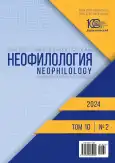Epithetization of love in M. Tsvetaeva’s texts
- Authors: Gubanov S.A.1
-
Affiliations:
- Samara University of Public Administration “International Market Institute”
- Issue: Vol 10, No 2 (2024)
- Pages: 326-333
- Section: RUSSIAN LANGUAGE. LANGUAGES OF PEOPLES OF RUSSIA
- URL: https://journal-vniispk.ru/2587-6953/article/view/295595
- DOI: https://doi.org/10.20310/2587-6953-2024-10-2-326-333
- ID: 295595
Cite item
Full Text
Abstract
INTRODUCTION. The study relevance is due to the need for a cognitive-semantic analysis of the mechanism of epithetization in M. Tsvetaeva’s texts. This is due to the central position of the characteristic vocabulary and the category of epithet in the poet’s individual style. The aim is connected to the study of the individual style specificity of the attribute verbalization of the concept “love” in M. Tsvetaeva’s texts, in the course of which the role of epithetization in the individual style system of the poet under study is revealed, the semantic content of this concept in M. Tsvetaeva’s texts, as well as the types of epithet words that verbalize this meaning.MATERIALS AND METHODS. Based on cognitive-semantic, component, lexicographic and lexicalsemantic, as well as statistical methods of analysis, the attribute verbalization of the concept “love” in M. Tsvetaeva’s texts is analyzed. The analysis of the characteristic nomination is carried out on the basis of the “Epithets of the Russian Literary Language Dictionary”. While studying the patterns of attribute verbalization of love in the poet’s texts, the main types of qualitative meanings actualized by the poet are identified.RESULTS AND DISCUSSION. The main trend within the framework of figurative understanding of the properties of this abstract concept was the anthropomorphization of “love”, personification, and the frequent use of metaphorical and metonymic epithet words with the defined concept “love”. Occasional features are expressed both by adjectival epithets and by lexemes atypical for epithet words, the most frequent of which is the substantive. The epithet paradigm, which verbalizes the characteristics of the concept under consideration, is represented by simple as well as compound epithet complexes in various positional variations.CONCLUSION. The research is addressed to specialists in the field of studying artistic speech, stylistics, linguistic poetics, cognitive linguistics, and linguistic color studies. The conclusion is postulated that M. Tsvetaeva’s creative style is distinguished by reflection on characteristic words, hints on the interpretation of their semantics or direct commentary. Various ways of verbalizing the characteristic component of the concept “love” emphasize the significance of this concept for the poet’s work. The study results can be used in further developments on the problem of epithetization in the Russian language and linguistic studies of M. Tsvetaeva’s creation.
About the authors
S. A. Gubanov
Samara University of Public Administration “International Market Institute”
Author for correspondence.
Email: gubanov5@rambler.ru
ORCID iD: 0000-0003-3011-4589
Dr. Sci. (Philology), Associate Professor, Associate Professor of Germanic Languages Department
21 G.S. Aksakov St., Samara, 443030, Russian FederationReferences
- Grashchenkov P.V., Lyutikova E.A. Adjectives in typology and linguistic theory: semantics, distribution, deriva-tion. Rhema, 2018, no. 4, pp. 9-25. (In Russ.) https://doi.org/10.31862/2500-2953-2018-4-9-33, https://elibrary.ru/ytrecl
- Arnol’d I.V. Stilistika. Sovremennyi angliiskii yazyk [Stylistics. Modern English]. Moscow, Flinta Publ., 2002, 384 p. (In Russ.) https://elibrary.ru/uugwer
- Tomashevskii B.V. Teoriya literatury. Poetika [Theory of Literature. Poetics]. Moscow, Aspekt-Press Publ., 2003, 333 p. (In Russ.) https://elibrary.ru/ywmpgn
- Kirov E.F. Discoursema and megaepiteth in discoursology. Kazanskaya nauka = Kazan Science, 2019, no. 3, pp. 93-95. (In Russ.) https://elibrary.ru/zcfdvb
- Bulakhova N.P., Skovorodnikov A.P. Concerning the definition of epithet (preparation to the functional characteristic). Ekologiya yazyka i kommunikativnaya praktika = Ecology of Language and Communicative Practice, 2017, no. 2 (9), pp. 122-143. (In Russ.) https://elibrary.ru/yusmrd
- Gubanov S.A. Peculiarities of the formation of epithets (on the material of texts by M. Tsvetaeva). Vestnik Niz-hegorodskogo universiteta im. N.I. Lobachevskogo = Vestnik of Lobachevsky University of Nizhni Novgorod, 2022, no. 6, pp. 195-201. (In Russ.) https://doi.org/10.52454/19931778_2022_6_195, https://elibrary.ru/weeutg
- Gubanov S.A. Epithet complex in Marina Tsetaeva’s texts. Teoreticheskaya i prikladnaya lingvistika = Theoretical and Applied Linguistics, 2022, vol. 8, no. 4, pp. 32-40. (In Russ.) https://doi.org/10.22250/24107190_2022_8_4_32, https://elibrary.ru/mwpdyc
- Lyapon M.V. Proza Tsvetaevoi: Opyt rekonstruktsii rechevogo portreta avtora [Tsvetaeva’s Prose: Experience in Reconstructing the Author’s Speech Portrait]. Moscow, Languages of Slavic Сultures Publ., 2010, 528 p. (In Russ.) https://elibrary.ru/sumdjh
- Pushkareva I.A., Lomakova A.V. The word-image “memory” in M.I. Tsvetaeva’s lyric poetry of 1920. Vestnik Tomskogo gosudarstvennogo pedagogicheskogo universiteta = Tomsk State Pedagogical University Bulletin, 2020, no. 3 (209), pp. 124-131. (In Russ.) https://doi.org/10.23951/1609-624X-2020-3-124-131, https://elibrary.ru/onwzmn
- Kabanina O.L. The evolution of the thematic zone “age” in Marina Tsvetaeva’s poetic worldview. Vestnik Tomskogo gosudarstvennogo universiteta = Tomsk State University Journal, 2022, no. 475, pp. 29-34. (In Russ.) https://doi.org/10.17223/15617793/475/4, https://elibrary.ru/rwqyfn
- Krylov V.N., Kuchumova M.O. Metonymy in the structure of marina Tsvetaeva’s prose. Vestnik Tomskogo gosudarstvennogo universiteta. Filologiya = Tomsk State University Journal of Philology, 2020, no. 68, pp. 267-279. (In Russ.) https://doi.org/10.17223/19986645/68/13, https://elibrary.ru/vojjqv
- Anisova A.A. Semantic field “insomnia” in M.I. Tsvetaeva’s early lyrics. Filologicheskie nauki. Voprosy teorii i praktiki = Philology. Theory & Practice, 2019, vol. 12, no. 10, pp. 127-131. (In Russ.) https://doi.org/10.30853/filnauki.2019.10.27, https://elibrary.ru/pissho
- Neznamova A.Yu. The epithet “Italian” in Alexander Pushkin’s literary, journalistic and epistolary works. Vestnik Tomskogo gosudarstvennogo universiteta = Tomsk State University Journal, 2022, no. 480, pp. 34-38. (In Russ.) https://doi.org/10.17223/15617793/480/4, https://elibrary.ru/rvjsmg
- Ledeneva V.V. Idiostil’ (k utochneniyu ponyatiya) [Idiostyle (to clarify the concept)]. Vestnik Moskovskogo universiteta. Seriya 9: Filologiya = Moscow University Philology Bulletin, 2002, no. 6, pp. 36-41. (In Russ.) https://elibrary.ru/ysfdbx
Supplementary files









